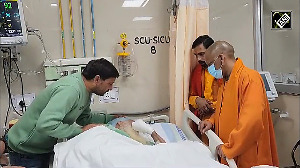There is a need for devising effective rehabilitation packages so that the displaced are not deprived of the fruits of development.
Vivek Mehra,
Executive Director, PricewaterhouseCoopers
One way to achieve stability is to let the displaced reap the benefits by giving them a proportion of developed land for agriculture.
How long will we continue celebrating our potential even while restraining ourselves from realising it? How true are these significant words penned by none other than Prime Minister Manmohan Singh, as we, day after day, continue putting blocks in the path of our own progress?
The SEZ policy hiccups are clearly a repeated example of such blocks. What is the message we are sending to global investors who are eyeing the SEZs for setting up their global manufacturing plants?
The frantic calls I have received from a couple of global shoe manufacturers having time bound plans to manufacture sports shoes in SEZs in India, instead of China, wishing to employ over 40,000 people, are fully justified. How do they plan their global manufacturing if such uncertainty keeps coming up?
Making India a global manufacturing hub, I firmly believe, is the only solution for creating jobs for the 71 million young Indians entering the working age population in the next five years. We must remember that two-third of this population lives in the rural areas and survives on subsistence farming. They have all watched colour-TVs and are aware of the superior quality of living in urban centres.
Many of them do not want to till the land any more and aspire for a better future, which equates to working in an urban environment. The IT sector, no doubt, will provide job opportunities, but only to a few of the teeming millions and those too will be largely restricted to the urban educated youth. This is where SEZs can pitch in.
There is an emergent need to educate and train the rural youth for employability in the manufacturing sector. Thus the manufacturing sector needs to grow by leaps and bounds very quickly. This can only be achieved if the government and all political parties set aside their political agenda and put their collective force behind implementing policies which will make India an attractive destination for becoming a global manufacturing hub.
Giving a push to SEZs should be an essential component of this thrust. The SEZ policy, based on private sector financing and aimed at creating both industrial infrastructure and social infrastructure, is clearly an important step in this direction and deserves the incentives that have been given.
The present SEZ hiccup is a fall-out of bad land acquisition policy and politics. Clearly the state governments need to adopt pragmatic land acquisition policies so that it does not lead to deprivation among the displaced, but becomes a win-win situation. One way to achieve this is to let the displaced reap some benefits of the development and this can
be done by giving them developed land for agriculture.
For instance, 2 per cent of all land acquired should be kept aside to be developed by the SEZ developer and allotted as residential / commercial land on a proportional basis to the persons from whom the land has been acquired and other displaced persons. This can be done alongside the physical displacement so that resettlement is immediate.
The values of such allotted commercial / residential developed land would rise with the value of the SEZ development resulting in appropriate compensation - truly a win-win situation.
The present National Policy for resettlement and rehabilitation of Project Affected Families (NPRR-2003) has been in force since February 2004, much before the enactment of the SEZ Act in 2005. Moreover, several states like Orissa, MP, Maharashtra and so on have their own rehabilitation policies offering better benefit levels to the affected families.
Is it, therefore, justified to put on hold all SEZ applications pending a new rehabilitation policy? Rehabilitation of the affected families, no doubt, should be the top priority and responsibility of the SEZ developer and the respective state governments. But we need also to be careful that we do not continuously send wrong messages to global investors.
We must break the pattern of sending out messages of an inconducive policy environment, which in the past has often deprived the country of great opportunities.
Mohammad Salim
MP, CPI(M)
Given the omissions and commissions of the past, there is mistrust besides fears about the genuine intention of the government.
The SEZ issue has been dominating the national discourse for quite sometime. The controversies regarding acquisition of land have brought the issue to the fore again. The government's decision to put on hold the process of according approval to a host of new proposals for SEZs has ultimately recognised the anxieties expressed earlier from several
quarters.
SEZs involve giving special treatment in terms of incentives, labour laws and tax benefits from the word go. There is genuine concern that the proliferation of SEZs will ruin the existing SMEs besides shrinking government revenues.
The prospect of a huge number of SEZs with requirement of land in thousand of hectares has also thrown up the spectra of disposition and displacement among people dependent on agriculture. Given the omissions and commissions in the past, there is mistrust besides fears about the genuine intention of the government.
Apparently, less enterprising people with minimum skills are bound to become more possessive about their only means of survival. No amount of compensation or rehabilitation can address the worries concerning fear of losing traditional occupation and known environs.
Given the deep agrarian crisis, the degree of resistance also depends on the viability of agricultural activities in specific areas.
This is why the CPI(M) has been engaged in taking up this issue since the concept of SEZ was evolved and the rules of the game were being framed. It is surprising to see P R Dasmunshi whose Cabinet cleared the rules and guidelines and accorded approval for scores of SEZs frequent Nandigram and incite people to oppose SEZs.
What does he have to say regarding the 300 odd SEZs coming up in Maharashtra, Haryana, Andhra Pradesh and so on, where his own party is in the driving seat?
Once the rules are framed and approval given by the Union government, the West Bengal government has to deliver and put things in practice. Despite this, West Bengal is implementing additional checks to ensure that SEZs are not used for real estate businesses. That is why there are proposals, such as the condition of at least 50 per cent of each SEZ being used for industrial activities; not considering more than four-five SEZ proposals; elaborate planning and monitoring to prevent large scale oustees and displacement; and avoiding, as far as practicable, fertile land and habitations.
Detailed rehabilitation packages beginning with skill formation/upgradation and engaging local people (including women) in the developmental activities have ensured direct and indirect benefits, including employment for the affected family members. The aim is to ease the pressure on land and rid farmers of over-dependence on agriculture.
That said, 68 per cent of the people in West Bengal are engaged in agricultural work while the contribution to SDP is 26 per cent. The rate of growth is also less than one-third of that of the SDP. Therefore, the state government has to embark upon industrialisation to create an environment for employment opportunities, poverty alleviation and
sustained growth.
This has sent all other parties and feudal formations in a tizzy. The tactics for delaying the implementation of the project where it has started and the urgency in resisting the process even where the plan of acquisition of land is not yet finalised betray the over-enthusiasm of the opposition in Bengal.
The Chief Minister of West Bengal was candid enough to admit the mistake of one of its administrative arms, namely the Haldia Development Authority which tried to jump the gun. But he refused to budge to gun-toting blackmailers out to abort the development process in West Bengal.
The changed SEZ policies, better compensation and rehabilitation packages at the national level and serious political and organisational initiatives at the ground level will help in keeping West Bengal on the track of development, and also earn the goodwill of the masses. The opposition is not fighting for land on behalf of the peasants; it is using the ordinary village folk to discover ground beneath its feet.







 © 2025
© 2025